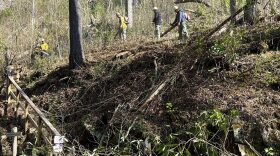A wildfire in Hyde County is releasing millions of tons of carbon dioxide into the atmosphere.
The Ferebee Road fire began on June 19 by an apparent lightning strike. As of 7 p.m. on July 5, the fire was approximately 1,940 acres in size and 70% contained, according to the North Carolina Forest Service (NCFS).
The fire is burning on private land in Carolina Ranch near the Pocosin Lakes National Wildlife Refuge. Pocosins are freshwater wetlands with peat soils. Peat soil has a high concentration of carbon because it's made from organic materials that have decomposed over thousands of years.
"It's terrible," Curtis Richardson said about the fire.
Richardson is a professor of resource Ecology at Duke University. He's also the founding director of the Duke University Wetland Center.
"[Pocosins] have a third of the world's carbon," Richardson said. "The peat [soil that's burning] is 8,900 years old. It's not something that you're going to replace tomorrow. You're burning ancient carbon. It's like setting a coal mine on fire."
The fire is no longer burning on the surface, but it's now burning underground into the soil. NCFS Incident Commander Michael Cheek said that makes it very difficult to address.
"We have stopped the horizontal movement across the landscape... but it's still moving down into the ground," Cheek said. "We've got areas that have burned [at least] 18 inches deep in the ground."
NCFS crews are pumping water from nearby lakes into the fire area. Crews have pumped over 170 million gallons of water so far.
The land that's burning is also where Richardson was conducting research.
"When we looked at satellite photos... our research plots are right in the middle of this fire," Richardson said.
Richardson was working with the owners of Carolina Ranch to re-wet the area that's now burning. Pocosin lands are often drained for agriculture or logging. A recent Duke study found draining pocosins and wetlands contributes to climate change.
In 2008, there was a similar fire in the same area. The Evans Road fire burned nearly 42,000 acres and lasted for about seven months. Most of the fire was within the Pocosin Lakes National Wildlife Refuge.
Besides emitting massive amounts of carbon, the fire is also damaging crucial habitat for several animals.
"This is the last refuge for [black bears] in the area," Richardson said. "Deer and turkey and quail — they will suffer as a result of this."
Richardson says more fires like this could happen if action isn't taken soon.
"There are literally tens of thousands of acres in the Southeast that are just waiting for this to happen," said Richardson. "You're going to put millions of tons of carbon dioxide in the atmosphere. It's just tragic."







